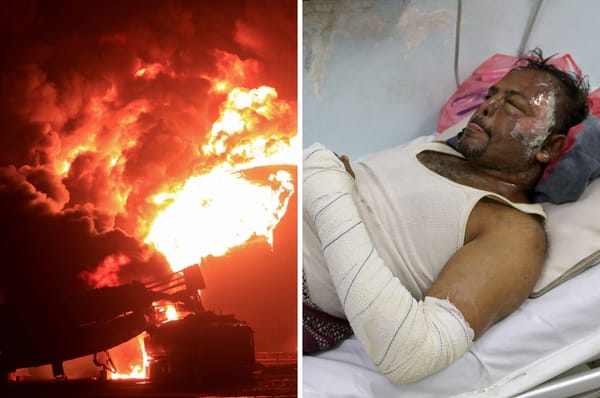🌏 The Biggest Heatwave Story You're Not Hearing About, First Black Woman German State Government Minister And More
All the world news you need to know this week.
Hello and welcome to the Almost newsletter, a weekly email to help you stay updated and make sense of important stories happening around the world including:
- 🌏 This Week’s Top Stories
- 👩 Women To Know
- 🙌 Good News For Your Week

Extreme heat has caused major wildfires to spread across several countries in western Europe and northern Africa, including Spain, Portugal and Morocco.
Passengers traveling from Madrid to Ferrol in Spain were temporarily trapped when the train was forced to stop by wildfires around the tracks.
Meanwhile, a Spanish man who was burned by wildfires while he tried to fight the flames to save his town has been hospitalized and is being treated for serious burns.
Italy has been suffering from its worst drought in 70 years, putting much of the country’s North in a state of emergency.
But Europe’s widely covered heatwave is just one of the many global warming events happening in recent years.
In March and April, heatwaves hit India and Pakistan, killing at least 90 people. The event was made 30 times more likely because of climate change.
In the Middle East, Iraq is experiencing its 3rd consecutive year of drought. NASA found the drought in the region from 1998 to 2016 was the worst in 900 years.
In East Africa, Somalia, Kenya, Ethiopia, and Djibouti are experiencing the driest conditions and hottest temperatures since satellite record-keeping began
1 in 3 people in Africa are affected by water scarcity. 13 million people in the Horn of Africa were facing severe hunger in the first quarter of 2022 as a result of the drought, according to the UN's World Food Programme.
Studies have shown that a group of developed and industrialized countries, the "Global North", are responsible for most of the carbon emissions that influence global warming.
The "Global South", on the other hand, are left in a position of disadvantage. Often, voices in these countries are missing, increasing inequalities.
Also Happening Around The World
🌏 Monkeypox has been declared a global health emergency by the World Health Organization.
🇺🇦 Liza Dmitrieva, a four-year-old Ukrainian girl with Down Syndrome has been killed by a Russian strike in the city of Vinnytsia on Thursday July 14.
🇹🇭 A baby elephant and its mother have been rescued after they fell in a pit in Thailand after a dramatic three-hour operation.

Aminata Touré, a 29-year-old Black woman with refugee parents, has made history as the first Black woman to hold a state government minister position in Germany.
Touré, whose parents fled to Germany from Mali after the 1991 coup d’etat, was sworn in as Minister of Social Affairs, Youth, Family, Senior Citizens, Integration and Equality for Germany’s northernmost state Schleswig-Holstein on June 29.
Born in 1992 in Neumünster, Touré grew up in a refugee shelter until she was five before she gained German citizenship when she was 12, according to German state media DW.
In 2012, she started studying political science and French at university and joined the environmentalist Green party.
Touré, who became a state lawmaker in 2017, attributed her decision to join politics to her family’s fear of being deported.
“[My parents] fought for survival and had no time for political participation,” she told DW.
In 2019, she was elected as the Schleswig-Holstein state parliament’s deputy speaker, becoming the first Black person and youngest person to hold the position across Germany’s 16 states.
Touré said she will fight for equality and against right-wing extremism in her new post.
More Women You Should Know About
🇲🇽 A Mexican woman who reported being harassed multiple times to authorities has died after she was set on fire, causing outrage again over violence against women in Mexico.
🇷🇺 Daria Kasatkina, Russia’s top ranked women’s tennis player, has come out as gay in an interview.
🇮🇳 An Indigenous tribal Indian woman has been elected to the role of the president for the first time in the country’s history.

After a hiatus due to the COVID-19 pandemic, thousands of people attended South Korea’s first Pride parade in 3 years in the country’s capital on Saturday July 16.
The pride parade was held as part of the Seoul Queer Culture Festival, which lasts until July 31st and includes other activities such as a film festival and performances.
An estimated 13,000 people attended the event at City Hall in Seoul, including multiple ambassadors from the US, Canada, UK, European Union, New Zealand and Norway.
Despite gradual improvements in their daily lives, South Korea’s LGBTQ community still face stigma with some conservative, religious groups blocking anti-discrimination laws.
In fact, the parade was marked by numerous conservative Christian protestors holding up signs which read, “Homosexuality not human rights but sin” and “No!! Same-sex marriage”.
The Seoul Metropolitan Police Agency deployed around 60 police officer units to tighten security and establish perimeters to maintain distance between Pride parade attendees and protestors.
The Seoul Pride parade was halted in 2021 and 2022 due to South Korea’s COVID-19 pandemic prevention protocols.
More Good News For Your Week
🇨🇳 A guy in China was eating at a restaurant and accidentally discovered 100 million-year-old dinosaur footprints.
🇬🇧 A British farmer created a giant 15-acre lego maze in a corn field.
🇮🇱 17 sea turtles have been released back to the Mediterranean Sea after months of rehabilitation in Israel.
Thanks so much for opening this email. If you think a friend would like this, you can forward it to them! You can also follow Almost on Instagram, TikTok or YouTube. We also have a Chinese version.
Let us know your thoughts about this week’s news in the comments or by replying directly to this email ✨




